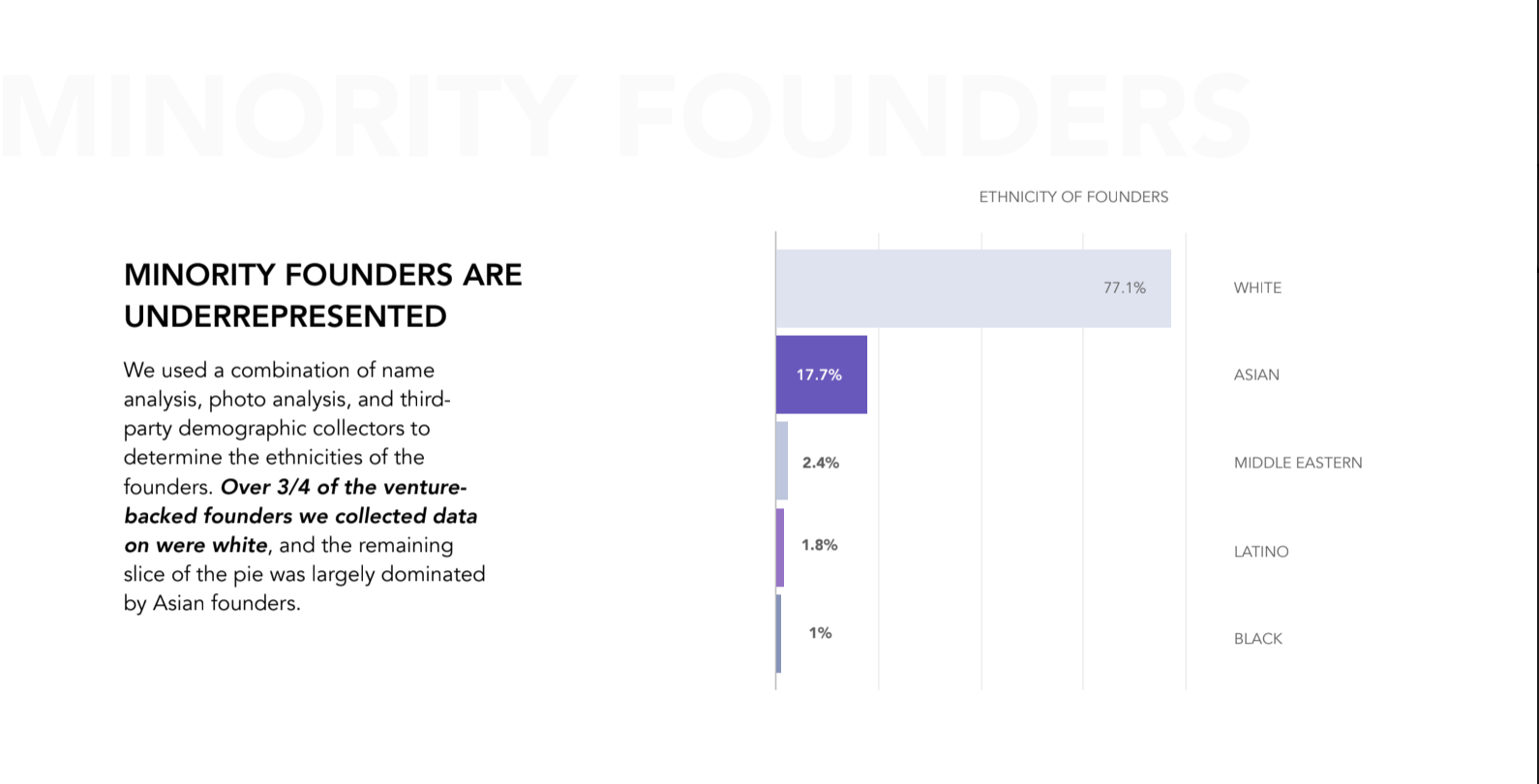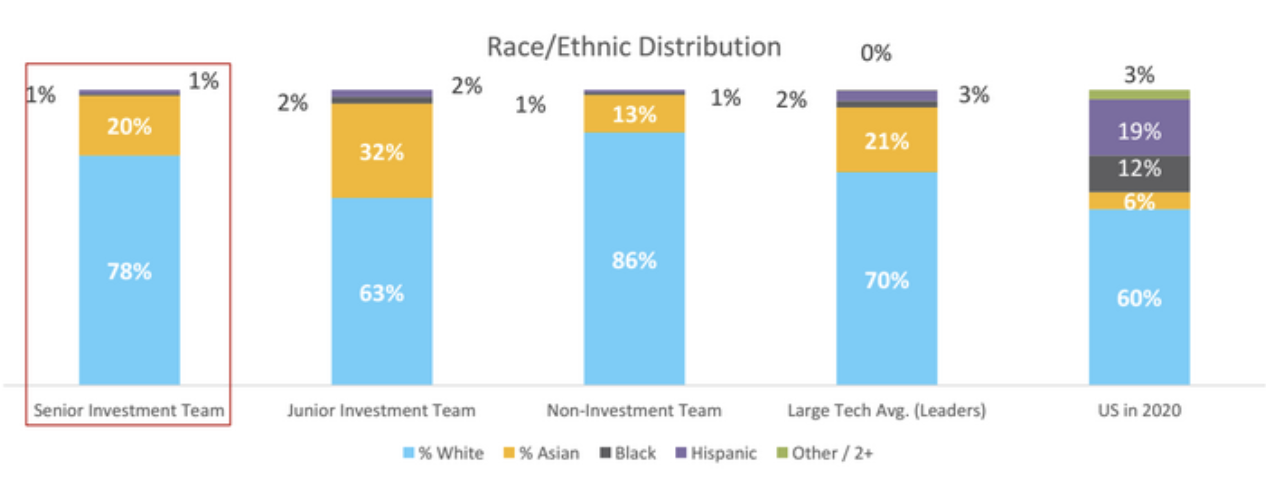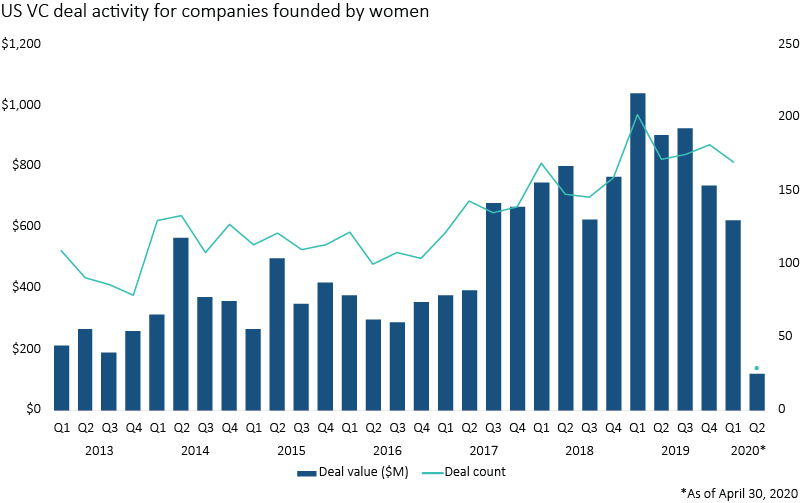Part
01
of one
Part
01
Minority Start-up Founders Research
Minority-founded startups suffer from crippling venture capital-biases, serious difficulty securing funding, and an acute lack of access to the critical mentorship often provided to white, male-founded startups.
We have curated eight additional pieces of information, data, and/or statistics surrounding the under-representation of minority startup founders in the United States and how they receive very little venture capital dollars when compared to non-minority founders. Minority startup founders have been defined as people of color, latinx, women, LGTBQ, disabled people, and other similar labels. As requested in a note provided to us in a follow-up email, we have focused on high growth startups needing venture capital like those in technology, and avoided data surrounding small businesses. In order to present one cohesive document, we have also brought over five of the relevant data points [with the addition of two graphics we thought would be helpful that were not included in the early findings] from the initial hour of research bringing the total number of data points to thirteen. We want to point out that we excluded the data points found in the early findings that mentioned small businesses.
- As revealed by a study conducted by RateMyInvestor in partnership with DiversityVC, most venture-backed startups are "still overwhelmingly white, male, Ivy League-educated and based in Silicon Valley," This study requires a download which we went ahead and did, and then placed in this Google document. If a personal download is required outside of a Google document, that can be done by providing an email address here.
- In the above referenced study, some statistics include: only 9.2% of startup founders are women, over 75% of the venture- backed founders were white, and the remaining 25% was largely represented by Asian founders (17.7%). "As well, just 1% of venture-backed founders were black, Latino founders made up 1.8% of those receiving funding, while Middle Easterners totaled 2.4%."
- "Only 5.3% of angel investors are minorities, while women make up 29.5% of angel investors and 11% of venture capitalists across the industry."
- In 2018, women founded 21.6% of all startups compared to only 4% in 2001. "However, a study found that men were significantly more likely to secure funding than women when pitching the same business content." Another study found that investors ask gendered questions, whereby men are asked about growth-oriented gains facilitated by capital and women are asked about non-losses.
- According to this 2020 report from Crunchbase, "Black and Latinx tech startup founders have made almost no progress in securing venture capital (VC) funding over the past seven years in the United States. During that period, startups led by Black and Latinx founders received just 2.4% of VC investments; so far for 2020, that figure is slightly higher at 2.6%."
- When looking back to 2014, funding to Black and Latinx founders was over $1 billion, which sounds impressive, but pales in comparison to the overall funding raised by U.S.-based startups. Looking closely at more recent data from 2018, funding to minority founders hit an all-time high of $4 billion, but when looking at all venture backed startups, that figure was also at an all-time high of $141 billion, making funding to minority founders only about 2.8% of that total. When digging into 2020 data, $2.6 billion has been raised by Black and Latinx founders which represents just 2.6% of the overall $87.3 billion raised this year through August.
- When examining the ten key venture firms in the United States, it was found that they have invested in only about 70 companies that are either Black- or Latinx-founded in the past five years. These VCs have invested in a total of 2,154 companies based in the United States since 2015. This translates to just 3% of those companies being Black or Latino founded startups. We noted that the two VCs with the "highest count of portfolio companies from this list are Andreessen Horowitz and Founders Fund."
- By 2045, the overall U.S. population is projected to become ‘minority white’, which "confirms the importance of racial minorities as the primary demographic engine of the United States future growth." According to Forbes this fact should wake VC firms up out of their stupor. Current figures have only 1% of African Americans holding senior leadership positions at venture capital firms. This suggests that "misrepresentation is creating a growing industry of investors who don’t align with present-day consumer and business interests."
- COVID-19 has had a destructive effect on female founders. According to PitchBook, the percentage of venture capital deals plummeted from "7.1% in Q1 2019 to 4.3% Q1 2020 for all-female founder teams." Eliza Haverstock, a financial writer covering private equity for PitchBook asserts, "For first-time founders, it could take months or even years to see better fundraising outcomes, depending on how an eventual economic recovery goes."
- Despite statistics pointing to the fact that investing in underrepresented founders is a great idea, the funding gap for this wide swathe of people is not narrowing. Continuing with COVID-19 related statistics, for the 3rd quarter of 2020, Pitchbook reports that funding for women-led startups declined by over 30%. As only 2.7% of funding went to women-led startups to begin with, this is a rather alarming statistic. It doesn't get much better for startups founded by Blacks and Latinx. According to ProjectDiane’s latest data, Black and Latinx women founders have received less than 1% of venture capital funding.
- According to ProjectDiane, "when Black and Latinx women founders do receive investment, they receive much less capital. The median seed round raised by Black women founders is $125,000 and the median seed round raised by Latinx women founders is $200,000. As of 2020, the national median seed round funding for a startup is $2.5M,"
- For any founder, being able to raise money for a startup can be challenging, but throw in the fact that they might be part of an underrepresented cohort, and that difficulty is taken up several frustrating notches. While women as a whole have it pretty tough compared to their male counterparts, receiving only 2.2% of venture capital (VC) funding in 2018, Black women have had it much worse over the past ten years, receiving only 0.0006% of VC funding in that time span.
- Trying to obtain VC funding can be extremely challenging for LGBTQ tech founders and entrepreneurs. Fewer than "1% of deals in the United States are given to LGBTQ founders, according to VC firm Backstage Capital." When it comes to being their authentic selves, 37% of LGBTQ founders feel too uncomfortable to "come out of the closet" to investors, according to StartOut, a non-profit for LGBTQ entrepreneurs.





